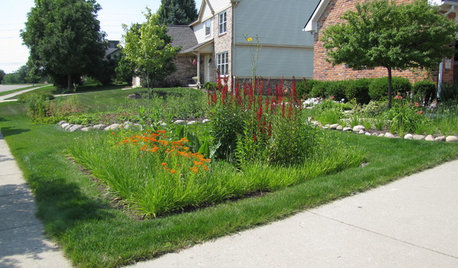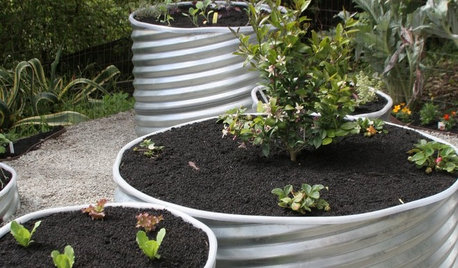Aluminum levels in soil
kokos
13 years ago
Related Stories

PATIOSPatio Details: A Custom Aluminum Arbor Cools Things Down in Texas
Panels in the roof have leaf pattern cutouts that create dappled shade and a calm, relaxed ambience
Full Story
GARDENING GUIDESGrow a Beautiful Garden in Alkaline Soil
Got alkaline soil? Learn how to manage it and the many beautiful plants that will thrive in this ‘sweet’ soil
Full Story
GARDENING GUIDESGardening Solutions for Heavy Clay Soils
What’s a gardener to do with soil that’s easily compacted and has poor drainage? Find out here
Full Story
FARM YOUR YARDHow to Get Good Soil for Your Edible Garden
The nutrients in your soil feed the plants that feed you. Here are tips on getting it right — just in time for planting season
Full Story
GARDENING GUIDESThe Poop Scoop: Enrich Your Soil With Good Old Manure
Get over the ick factor already — this natural super-ingredient for soil has so many benefits, you'll wonder why you ever went chemical
Full Story
LANDSCAPE DESIGNHow to Shape a Rain Garden and Create the Right Soil for It
Learn how to grade, lay out and amend the soil in your rain garden to support your plants
Full Story
CONTAINER GARDENSContainer Gardening Basics: The Dirt on Soil
Learn the types of potting soil available and the best mixes to help your containers thrive
Full Story
GARDENING GUIDESHouzz TV: Make a Worm Bin for Rich Soil and Happy Plants
A worm-powered compost bin that can fit under a sink turns food scraps into a powerful amendment for your garden. Here’s how to make one
Full Story
LANDSCAPE DESIGNThis Hillside Garden Succeeds on Multiple Levels
Once a kids’ playspace, this terraced backyard now has a hot tub, dining area and other lounging spots for grown-up fun
Full Story
GARDENING GUIDESCommon Myths That May Be Hurting Your Garden
Discover the truth about fertilizer, soil, staking and more to keep your plants healthy and happy
Full StoryMore Discussions









gardengal48 (PNW Z8/9)
goren
Related Professionals
Arnold Landscape Architects & Landscape Designers · River Forest Landscape Architects & Landscape Designers · Clark Landscape Contractors · Clayton Landscape Contractors · Fort Atkinson Landscape Contractors · Lynwood Landscape Contractors · Mendota Heights Landscape Contractors · Morrisville Landscape Contractors · Mount Sinai Landscape Contractors · New Cassel Landscape Contractors · New Providence Landscape Contractors · Ramsey Landscape Contractors · Jackson Decks, Patios & Outdoor Enclosures · Lockport Decks, Patios & Outdoor Enclosures · Myrtle Beach Decks, Patios & Outdoor Enclosuresgardengal48 (PNW Z8/9)
bpgreen
kokosOriginal Author
kokosOriginal Author
gardengal48 (PNW Z8/9)